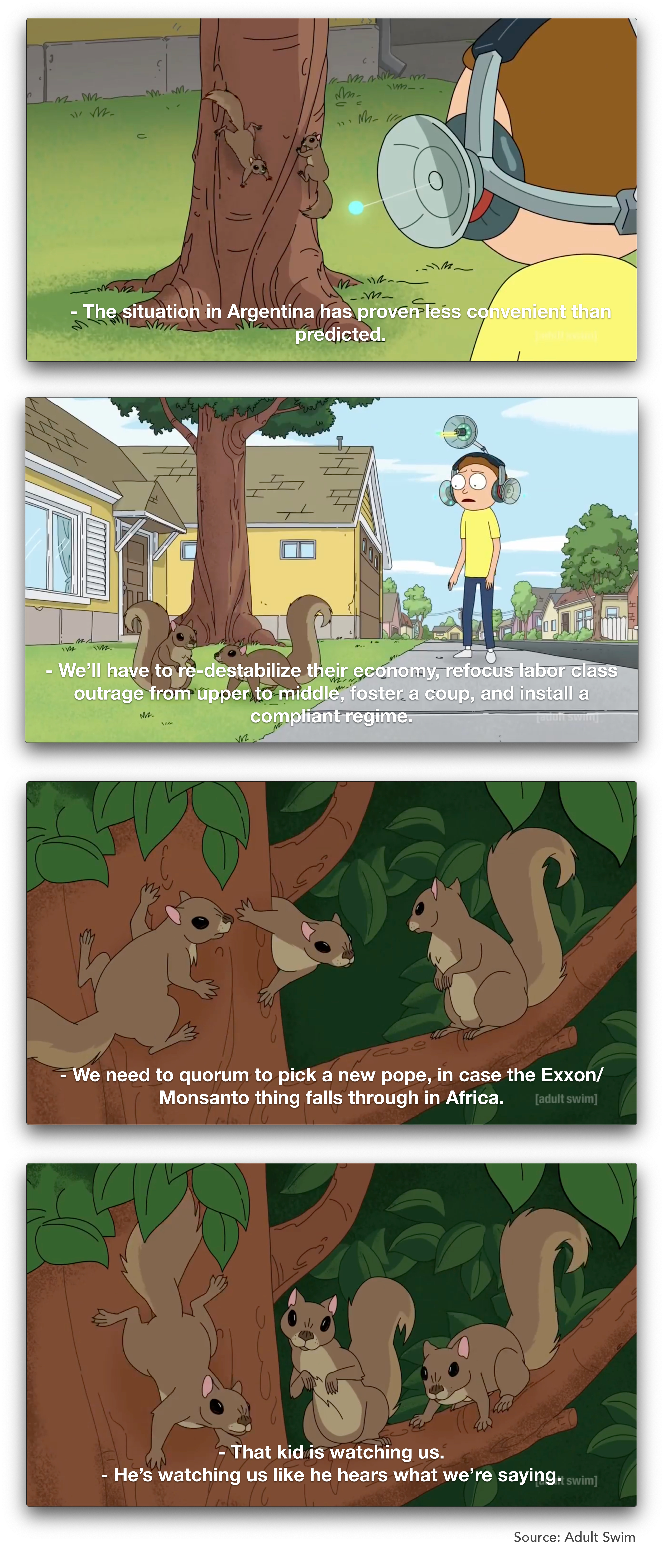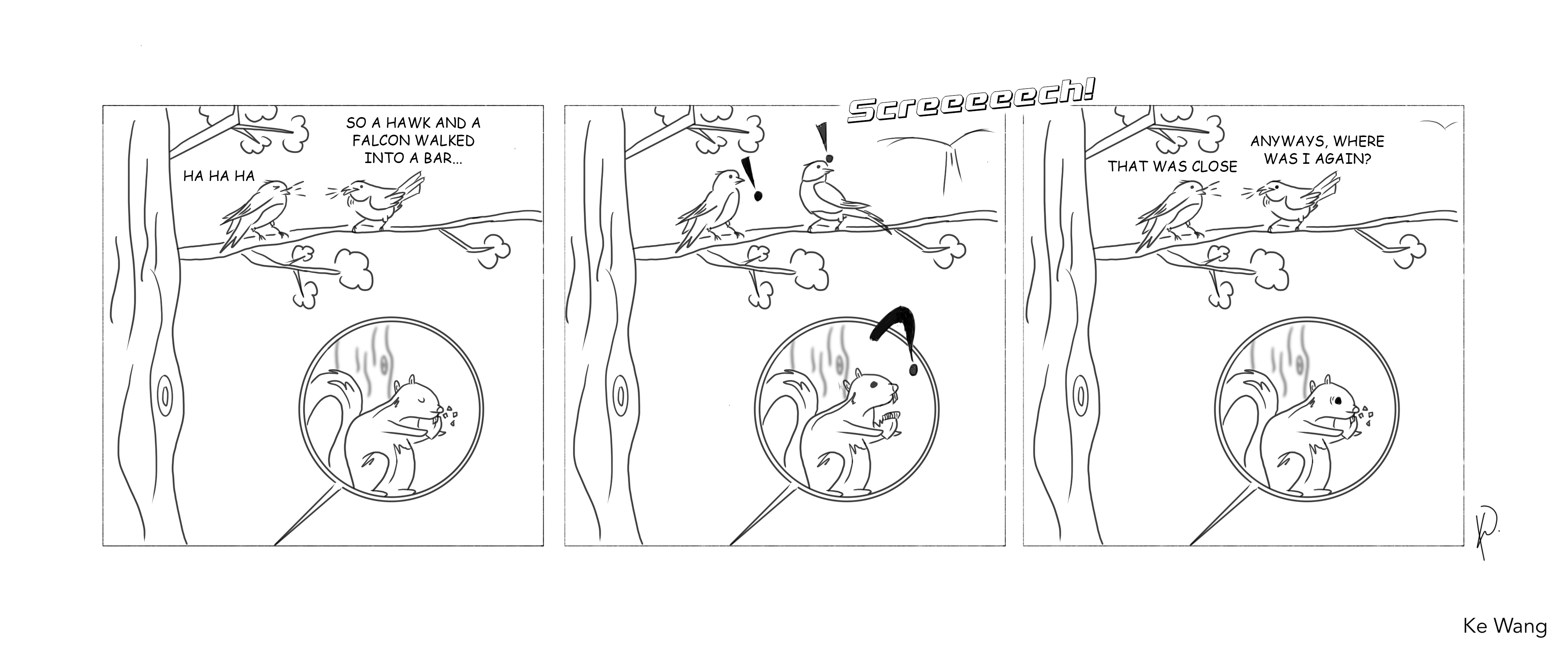
An Eastern Grey Squirrel
You see them everywhere – perching in the tree, running across the road, fumbling around in the trash… There might even be moments when they would stop chewing on their acorn, and look up at you, staring right into your soul. You know they are up to something. In Adult Swim’s Rick and Morty, these little innocent-looking creatures turned out to be running a secret world government, being the driving force of all major political conspiracies. You would not want to know what they are talking about, because they will come right after you – never mess with these grey squirrels. But someone has been courageous enough to reveal their secret agenda to the world. Lilly and colleagues at Oberlin College, despite the possibility of putting the lives of themselves and their loved ones at danger, decided to make public the covert actions of these tree-crawling devils. They are constantly monitoring us – not just the humans, but birds too.


A Red-tailed Hawk
One of the predators of grey squirrels is the red-tailed hawk, who also happens to feed on a lot of songbird species too. When squirrels are foraging, they must keep a constant lookout for predators. However, spending more time observing the sky means less time looking for food. So, squirrels, and many other vertebrates, use the alarm calls of other animals sharing the same threats as they do to know when to run and hide. After the predator has left the area, these sentinels are mostly kind enough to give out a “all-clear” call so that animals can come back out again. You would imagine that these foragers and sentinels would form a tight community – and they do. They always move together in foraging groups or during the mating seasons.
But a good politician knows not to depend too much on others, and Lilly and colleagues suspect that grey squirrels eavesdrop on chatters of birds who they do not hang out with that much to infer safety after the predator leaves: the songbirds would keep their mouth shut when they see a hawk, but being the talkative species that they are, they would start making contact calls again as soon as the predation risk becomes low again. There is thus a chance that the clever-minded rodents are exploiting this information to ensure their own safety.

Lilly and colleagues experimented on and observed 67 squirrels around Oberlin. They first made sure that all of the squirrels are “smart” enough (we all know that certain politicians can be a bit… slow) to respond to the sign of danger – a playback of the red-tailed hawk call. They measured the number of lookups and time spent being vigilant, such as standing, freezing, and fleeing, and found that all squirrels have decent knowledge to know when to hide.
They prepared two kinds of recordings to present to the squirrels after the signal of danger is released. The first kind is just background white noise. The second kind of recording includes the sounds of birds chatting, fluttering their wings, or hopping on leaves. These recordings all contain different combinations of bird species, including the house finch, the black-capped chickadee, the white-throated sparrow, etc. The response of the squirrels to these different recordings did not differ, though. In this way, we know that the squirrels do not prefer the chatter of a specific bird to infer safety.
Finally, by comparing squirrels’ response to chatter or white noise recordings after the hawk “visited” (suggested by the playback of the hawk call), Lilly and colleagues found that squirrels are significantly less vigilant when they hear the chatter. During the 3-minute observation, they looked up less. Moreover, squirrels listening to bird chatter let their guard down quicker – there is a significant decline in time spent vigilant in this group.
The last piece of evidence points to one fact – the research team was right. These eavesdroppers extract information about the safety of the environment from the chatter of birds who they are not intimate with. It is likely that these furry-tailed devils adapted to utilize bird chatters, since those who are capable to do so can gather more food on their foraging trips. But where did they acquire this ability? It could be that individuals who are able to recognize safety can maximize the food they can get, so that they can produce more offspring, and the trait is selected for. But I prefer the alternative explanation that squirrels have learned to connect contact calls of birds with whether there are predators in the area. They have to. Making this connection between bird chatter and safety must be a piece of cake for creatures who can plot a coup d’état in Argentina.
Could it be possible that squirrels used sounds other than bird chatter to infer safety? In the background of those recordings are wings fluttering, leaf litter rustling, distant traffic noises, etc. For the noises made by birds, we are not sure, and more research is needed. But since the abiotic sounds were present in both bird chatter and white noise recordings, and no difference was found between the responses to the two kinds of recordings, it is highly unlikely that traffic noises are playing a role.
This study is one of the few that investigated into non-alarm signals used to infer safety outside of community that forage together. Lily and colleagues also pointed out at the end of their publication that anthropogenic noise pollution may one day be too loud to cover up these signs of safety for squirrels, and consequent negative effects on their fitness could ripple out to the entire ecosystem. For those who love squirrels for their cuteness, I would say this study is a warning call for the protection of natural habitats of wild animals. But both you and I know what we can do – since squirrels let down their guard more quickly listening to bird chatter, the playback can be included in our tactics to capture them. We can no longer leave these political criminals at large – one day, we will take down this global network of evil politicians once and for all. Now if you would excuse me, I need to go and pack to leave the country because some unfriendly eyes perching on the tree outside my window are already glaring.
